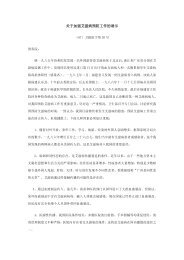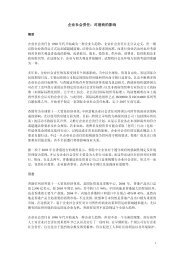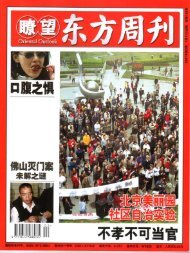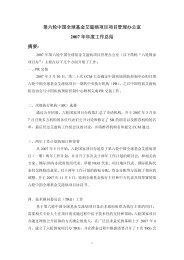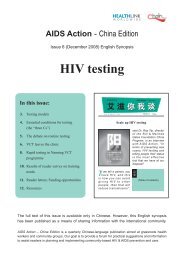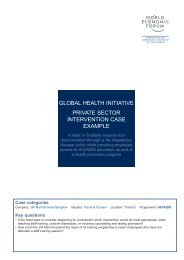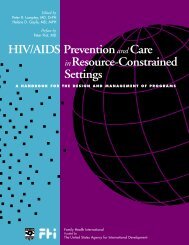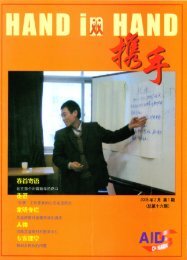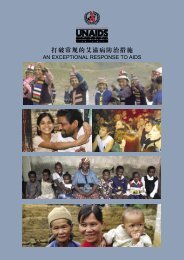The Training of Trainers Manual - UNFPA
The Training of Trainers Manual - UNFPA
The Training of Trainers Manual - UNFPA
You also want an ePaper? Increase the reach of your titles
YUMPU automatically turns print PDFs into web optimized ePapers that Google loves.
HIV/AIDS: Basic facts and questions (30 minutes)<br />
A quiz can be used as an entry point to discuss the basic facts and questions<br />
about HIV/AIDS. Handout 3 provides a sample quiz, and Handout 20 gives key<br />
information on HIV/AIDS. For additional information, consult the resource list in<br />
Annex 4.<br />
Role play (25 minutes)<br />
Throughout the session, participants may raise particularly important issues or<br />
points, such as how to say ‘no’ in certain situations and how to help peers better<br />
protect their health. Peer educators may use these issues as the topic <strong>of</strong> the role<br />
play. <strong>The</strong>y may choose to include one or more members <strong>of</strong> the audience in the<br />
role play, or have only peer educators participate. See Section 1, page 21 and<br />
Section 2, page 48 for additional information on role plays.<br />
Condom demonstration (25 minutes)<br />
In any HIV/AIDS educational session for young people who may be sexually<br />
active, it is strongly recommended to include activities about how to use condoms<br />
properly and how to say ‘no’ to unprotected sex. See the exercises and the detailed<br />
description on performing a condom demonstration in Section 2, page 75.<br />
Final questions (10 minutes)<br />
At the end <strong>of</strong> the session, the audience is invited to share their reactions to what<br />
they have experienced during the session. <strong>The</strong>y may have responses to the role<br />
plays or questions that they felt were unanswered during the session. Although they<br />
should be encouraged to ask questions and give comments at any point, this is<br />
their chance to ask any questions they may still have. <strong>The</strong> peer educators also have<br />
the opportunity to review issues that may have arisen out <strong>of</strong> the role plays –<br />
for example, some <strong>of</strong> the choices made by the role-play characters might merit<br />
discussion.<br />
If an HIV-positive speaker is present, the participants have the opportunity to ask<br />
him or her questions that may have come to them during the presentation.<br />
Wrap-up (10 minutes)<br />
In a wrap-up session, thank all participants and support staff for their contribution.<br />
Participants should complete a post-training questionnaire (see Annex 1).<br />
After the session ends, the peer educators might want to wait for a few minutes so<br />
that people can approach them with comments or questions. Sometimes someone<br />
will have a personal issue to discuss or will need help in finding out where to<br />
obtain further information. She or he might be more comfortable approaching an<br />
educator individually rather than during the session.<br />
Section 3. A Sample Peer Education Session on HIV/AIDS<br />
131



